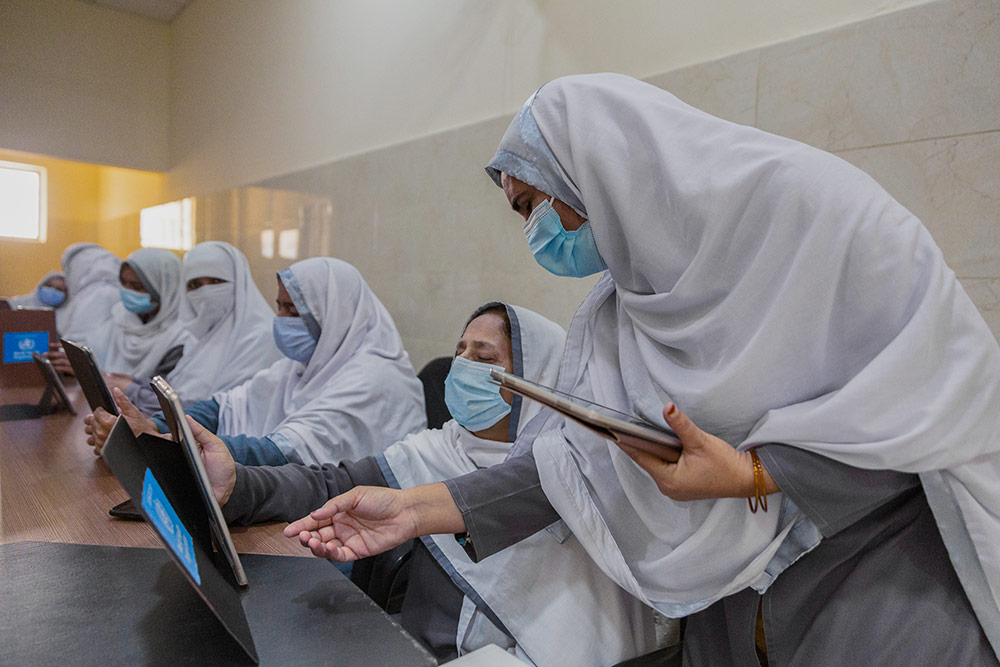
Introduction: Surveying the NCD burden, assessing risk factors and driving change
Pakistan initiated a comprehensive STEPS survey to assess the burden of noncommunicable diseases (NCDs) and their associated risk factors. With NCDs being a leading cause of death and disability in the country, the Ministry of Health undertook this survey in two provinces, covering 75% of the population. By focusing on questionnaire assessments, physical measurements and digital data collection, the survey results have paved the way for the establishment of the NCD Unit and the implementation of programmes aimed at preventing and controlling NCDs. Furthermore, the survey findings led to a significant decision to ban the sale of soft drinks near schools. This narrative provides a comprehensive overview of Pakistan's STEPS survey, including its methodology, challenges faced, impactful outcomes and future plans.
Context: Bridging data gaps
Uncovering NCD risk factors via the STEPS survey. NCDs account for a substantial proportion of deaths in Pakistan. It is estimated that NCDs contribute to approximately 57% of all deaths in the country, primarily incorporating cardiovascular diseases, cancers, diabetes and respiratory diseases. However, the country lacked national-level data on NCD risk factors. To address this gap, the STEPS survey was initiated, aiming to identify the risk factors associated with NCDs and determine their prevalence in Pakistan.
The STEPwise approach (STEPS) to NCD surveillance. The survey on risk factors for NCDs was conducted using the WHO STEPS methodology, which comprises three distinct steps. STEP1 involved a questionnaire-based assessment, STEP2 included physical measurements and STEP3 incorporated biochemical measurements. The target population for the survey was individuals aged 18 years and above, incorporating both males and females residing in Punjab and Sindh provinces. These provinces were chosen as they represent approximately 75% of Pakistan's total population. Due to budgetary constraints and a lack of recent population size data, the survey was limited to these two provinces, resulting in the exclusion of STEP3 measurements. The population size used for sampling was derived from extrapolated data from the 1998 census.
To ensure accurate data collection, eight teams were formed, each comprising an enumerator, a supervisor and three interviewers (including at least one female). The teams were trained in survey protocols, the use of digital devices for data collection, and the collection of physical measurements such as height, weight and blood pressure. Independent monitors oversaw the data collection process to maintain data quality. The collected data were subsequently analyzed using EPI Info 3.5.1, following the statistical plan outlined in the WHO STEPS protocol.
Challenges and lessons learnt: Navigating provincial decentralization, data collection and gaining insights
The decentralization of health matters to the provinces posed a significant challenge, requiring prior permission from all provincial health ministries and departments. Additionally, streamlining the involvement of various stakeholders proved to be a hurdle, lacking a fast-track system to bring them together. During data collection, challenges such as low literacy rates, limited understanding of the survey's importance and utility, cultural taboos against sharing personal information, and instances of resistance from local elders were encountered by the data collectors.
Lessons learnt from the survey include the importance of engaging key stakeholders from the planning stage, including health departments and law enforcement agencies, particularly district administrations, to prevent any unwanted incidents. Raising public awareness through mass communication channels and involving local elders and Imams in local announcements can contribute to sensitizing the population. Additionally, participants suggested that biochemical measurements (STEP3), including lipid profiles, HbA1C, fasting blood glucose, urinary sodium and urinary creatinine should be included in future surveys for enhanced validity and data authentication.
Impact: NCD unit establishment, prevention programmes and school soft drink ban
The survey findings were widely disseminated through workshops across the country, effectively sensitizing health professionals and policymakers. This resulted in several significant steps being taken at different levels:
Establishment of the NCD Unit. A dedicated unit was established at the federal level within the Ministry of National Health Services, Regulation and Coordination in Islamabad. The Provincial Health Department of Punjab also established its own unit.
Launch of the NCD Prevention and Control Programme. The Government of Punjab initiated a comprehensive programme focused on NCD prevention and control. This multisectoral approach promotes risk factor modifications through health promotion, early detection and management, strengthened healthcare services, and continuous monitoring and evaluation.
Ban on soft drink sales near schools. The Government of Punjab imposed a ban on the sale of soft drinks inside schools and within a 100-meter radius to reduce the burden of NCDs among schoolchildren.
Next steps: Nationwide replication and STEP3 integration
As more than five years have passed since the previous survey, there are plans to replicate the STEPS survey nationwide. The upcoming survey will also include STEP3, incorporating biochemical measurements to further enhance the validity and depth of the data collected.
Story originated in 2019.


